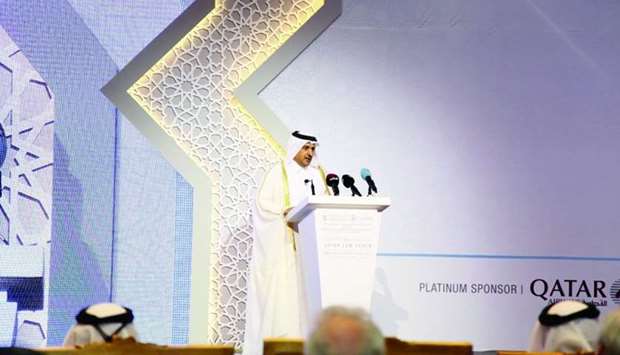The Attorney General said Qatar was built on the principles of justice and equality since it was founded by Sheikh Jassim bin Mohamed bin Thani. "Qatar was built on justice and equality among all to be the basis for its establishment, survival and continuity, which is the most valuable principle," he said adding that that justice, equality and the consolidation of law in the State has continued throughout history, which has added to its strength.
Al-Marri said its leaders have practised justice - such as His Highness the Father Emir Sheikh Hamad bin Khalifa al-Thani who ruled between litigants, thus re-establishing the history of the glorious Islamic nation at the beginning of its time when the Caliphs sat to judge and adjudicate people's cases.
Al-Marri said this practice continued during the Father Emir's time, and resulted in the advancement in the rule of law that was valued and respected by the world after the permanent constitution of the State was issued.

Senator George Mitchell

Faisal al-Sahouti and Sir William Blair

Lord Phillips

Masoud al-Amri
The Attorney General said that Qatar's constitution differs from the rest of the world's statutes by ensuring the total separation of the three authorities - legislative, executive and judicial. The constitution also gives the judiciary its status to clarify the overlapping between the three authorities, which is always an issue in all countries.
Al-Marri said the rules of Islamic laws were considered whilst drafting the permanent constitution as well as the latest Latin laws and legislation to separate the three authorities. Al-Marri added that Qatar was able to overcome the doubtful and gray area between the judicial and executive authorities and "truly separate them".
Al-Marri also praised the partnership with the United Kingdom in the third edition of the forum, due to its rich history in law, respect for justice and strengthening of equality.
His Highness the Emir officially opened Qatar Law Forum 2017 on Sunday, with keynote addresses by the Attorney-General, who is also president of the Board of Trustees of the Rule of Law and Anti-Corruption Centre (ROLACC); Lord Phillips, president of the Qatar International Court and Dispute Resolution Centre (QICDRC); and Senator George Mitchell, former independent chairman of the Northern Ireland Peace Talks and former US Special Envoy for Middle East Peace.
Lord Phillips stressed that the patronage of the Emir to the third Qatar Law Forum encourages search for solutions to issues related to the rule of law and its enforcement.
He said Qatar continues to play an important role in strengthening the rule of law not only in the region but also around the world.
He confirmed the importance of law enforcement on all levels, especially as it will contribute to reducing many issues and problems witnessed in the region and around the world, such as economic crises, terrorist threats, displacement and refugees issues which are growing rapidly and in need of effective protection under the law.
Senator Mitchell, former head of the Northern Ireland peace process, said the Qatar Law Forum inaugurated in 2009, encourages exchange of ideas to protect the rule of law and achieve peace, justice and strong institutions. Mitchell said such topics are currently more relevant than at any other time.
Mitchell added that rule of law can play an important role in the current crises and turbulent events witnessed in the region. He said through law enforcement, people can reconcile among themselves and overcome crises and conflicts, especially as this reflects the understanding that everyone is subject to the rule of law, committed to its implementation and work under it.
On the existence of peace, justice and strong institutions which were the topics discussed in the forum, Mitchell said they comply with the principles of respecting the rule of law, where these principles are particularly important because they bring all parties together around the negotiating table.
Mitchell then referred to the Irish crisis where the parties had to accept principles based on the law, and remian committed to peaceful and democratic ways to resolve political disputes, abide by any agreement reached and resort only to democratic, peaceful ways and means to negotiate differences, which in turn strengthens the rule of law in any situation.
Mitchell confirmed that the rule of law is the only mechanism and framework that leads to reaching and entering into an open debate to resolve any dispute between two sides and that negotiations are the best way to reach an agreement between the parties to the conflict.
He also referred to the need to continue efforts within the framework of the rule of law and to work to create frameworks and bases for peace and security in the region and between the conflicting parties around the world.
He added that if all the countries committed to applying the rule of law, it will be a stepping stone to settle any existing conflict.
The keynote speeches were followed by two plenary sessions, first on effective judicial institutions (tackling delay and access to justice) chaired by Lord Thomas, former Lord Chief Justice of England & Wales, with Masoud al-Amri, president of the Supreme Judicial Council, in attendance.
Yousuf al-Jaidah, CEO of Qatar Financial Centre and Professor Sir William Blair joint-chaired the final session on the rule of law and financial inclusion.
Faisal Rashid al-Sahouti, CEO of QICDRC, stressed that the hosting of the global forum in Doha and the attendance of His Highness the Emir demonstrated "Qatar’s commitment to the rule of law and our willingness to lead the rule of law debate in the region".
The Qatar Law Forum is organised by ROLACC and QICDRC.

